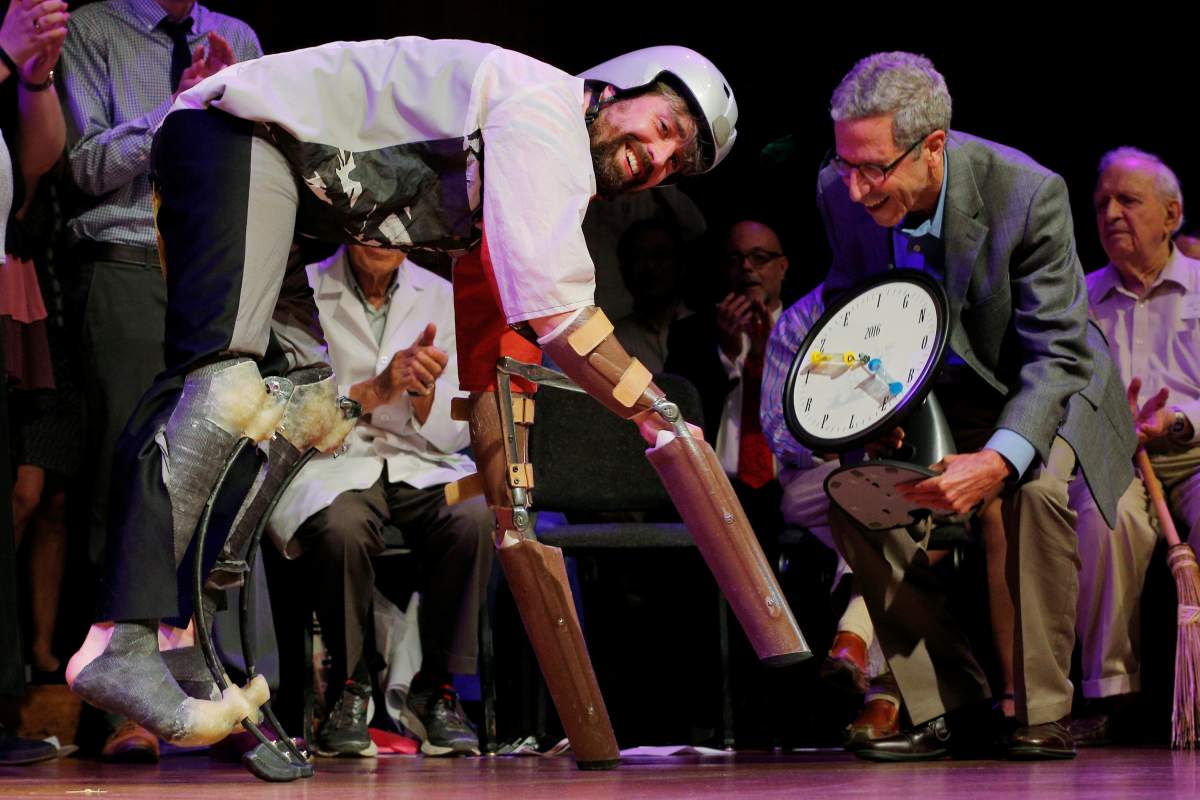BOSTON – A Swede who wrote a trilogy about collecting bugs, an Egyptian doctor who put pants on rats to study their sex lives and a British researcher who lived like an animal have been named winners of the Ig Nobels, the annual spoof prizes for quirky scientific achievement.

The winners were honoured — or maybe dishonoured — Thursday in a zany ceremony at Harvard University.
The 26th annual event featured a paper airplane air raid and a tic-tac-toe contest with a brain surgeon, a rocket scientist and four real Nobel laureates.
Winners receive $10 trillion cash prizes — in virtually worthless Zimbabwean money.
READ MORE: Canadian-led ‘Jesus in toast’ study wins 2014 Ig Nobel Prize
This year’s Ig Nobels, sponsored by the science humour magazine Annals of Improbable Research , included research by Fredrik Sjoberg, who published three volumes about collecting hoverflies on the sparsely populated Swedish island where he lives.
It sounds downright dull, but Sjoberg’s books are a hit in his homeland, and the first volume’s English translation, “The Fly Trap,” has earned rave reviews.
“I had written books for 15 years (read by no one) when I finally understood it’s a good thing to write about something you really know, no matter what that might be,” Sjoberg said in an email, describing the award as the pinnacle of his career.
“The Ig Nobel Prize beats everything,” he said. “At last I hope to become a rock star. Leather pants, dark sunglasses, groupies. All that.”
Ahmed Shafik decided rats needed pants.

Get breaking National news
He dressed his rodents in polyester, cotton, wool and polyester-cotton blend pants to determine the different textiles’ effects on sex drive. The professor at Cairo University in Egypt, who died in 2007, found that rats that wore polyester or polyester blend pants displayed less sexual activity, perhaps because of the electrostatic charges created by polyester. He suggested that the results could be applied to humans.
The study did not explain how he measured a rat’s waist and inseam.
Charles Foster, a fellow at the University of Oxford in the United Kingdom, won for literally living like an animal. He spent months mimicking a badger, an otter, a fox, a deer and a bird in an attempt to see the world through their eyes, then wrote a book, “Being a Beast,” about his experiences.
He lived as a badger in a hole in a Welsh hillside; rummaged like a fox through trash cans in London’s East End looking for scraps of chicken tikka masala and pepperoni pizza; and was tracked by bloodhounds through the Scottish countryside to learn what it’s like to be a deer.
It wasn’t much fun.
“I was hunted down quite quickly,” he said.
Another scientist from England won for a similar project; Thomas Thwaites added prosthetic extensions to his arms and legs and lived as a goat for a while.

Andreas Sprenger was part of a team at the University of Luebeck in Germany that found that if you have an itch on one arm, you can relieve it by looking in a mirror and scratching the opposite arm. Sound silly? But imagine, Sprenger said via email, if you have a skin condition with an intolerable itch, you can scratch the other arm to relieve it without rubbing the affected arm raw.
Gordon Logan, a professor of psychology at Vanderbilt University, and colleagues from Canada and Europe won for their research on lying. Their study of more than 1,000 people who are ages 6 to 77 — “From junior to senior Pinocchio: A cross-sectional lifespan investigation of deception” — found that young adults are the best liars.
How do the scientists know their subjects weren’t lying to them?
“We don’t,” Logan said.
*with a file from Global News









Comments